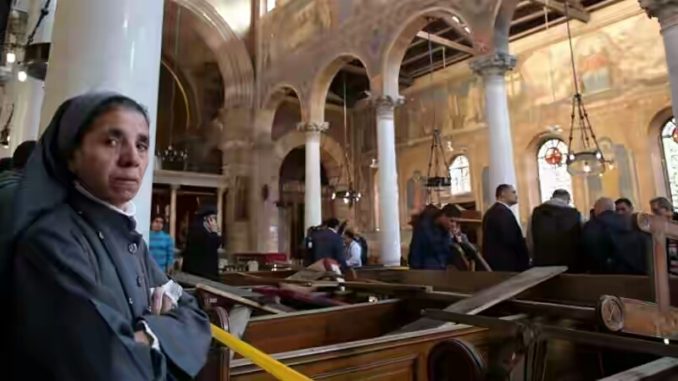
Egyptian Coptic Orthodox Christians have been told by church leaders to cancel all events and activities outside churches in July because of a security threat, church and security sources said on Thursday.
The warning followed an attack in May by the Islamic State of Iraq and the Levant (ISIL, also known as ISIS) group on Copts travelling to a monastery in central Egypt that killed 29 people. A month earlier, 44 people were killed in bomb attacks at a cathedral and another church on Palm Sunday.
Sources said the warning was given to individual church leaders by a representative of the Coptic Orthodox Pope. Copts on trips or youth camps had been told to cut short their activities and return home early.
A Coptic church official, who spoke on condition of anonymity because he is not authorised to speak to the media, told Reuters that his church received “oral instructions this week, nothing written, to prevent panic,” he said.
The source said the church was provided with more security forces to secure the gates of the church this week.
Coptic Church spokesman Bolus Halim confirmed the moratorium on some activities to AFP news agency
Security officials, pastors and other activists told The Associated Press news agency that a warning was delivered to church representatives during a meeting this week with top army and security commanders in the southern city of Assiut. They have also been told that army troops backed by armoured vehicles and snipers would be deployed outside monasteries hosting major religious festivals in coming weeks.
The Egyptian Catholic church said it got similar instructions. The church “complied with the interior minister’s decision to cancel church trips and camps until further notice,” Father Rafik Greish, a spokesman for the Coptic Catholic Church, told Reuters late on Thursday.
The Reverend Andrea Zaki, head of the Egyptian Evangelical Church, told AFP news agency that his demonination’s outside events were cancelled, although church services were not affected.
“We are talking about conferences and travel for religious events, for three weeks, because we have information in cooperation with the responsible agencies that attempts to attack have been detected,” he said.
Egypt faces an insurgency led by the ISIL group in the Sinai Peninsula, where hundreds of soldiers and police have been killed since 2013.
At least 23 soldiers were killed last week when suicide car bombs tore through two military checkpoints in the region in an attack claimed by ISIL. It was one of the bloodiest assaults on security forces in years.
But ISIL has also intensified attacks in the mainland in recent months, often targeting Coptic Christians. About 100 Copts have been killed since December.